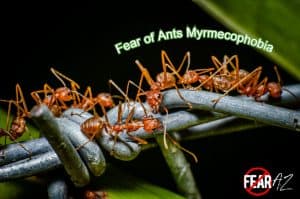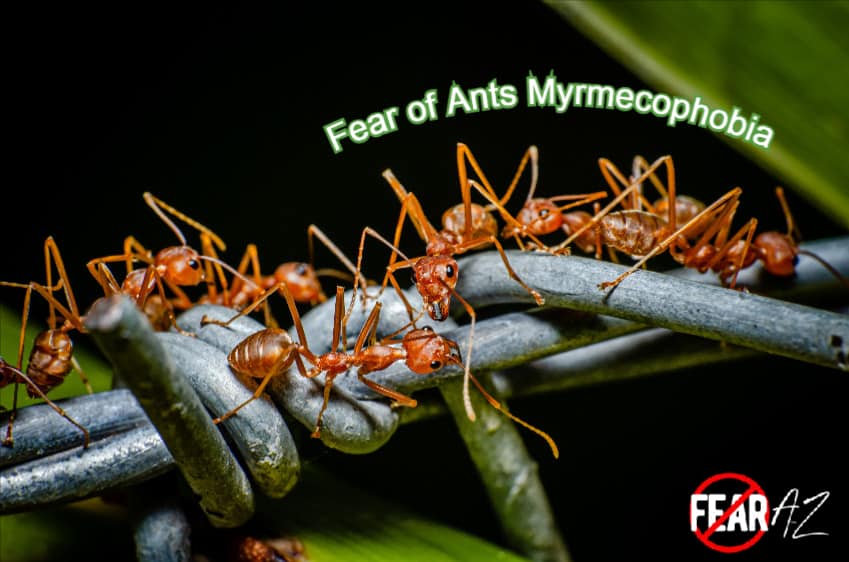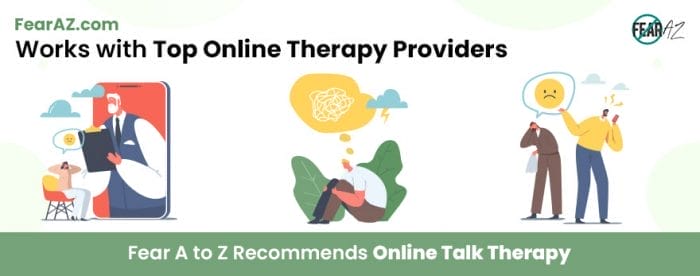Share This Article
20 Quadrillion Ants: Imagine the Fear
Do you experience anxiety, stress, or panic when you see an ant or even think of one? Does the thought of ants crawling around your home and garden leave you feeling overwhelmed or helpless?
Do thoughts of ants fill you with dread, causing you to tremble or panic? Do you feel dizzy and nauseous at the sight of them?
If so, you may have myrmecophobia, or ant phobia. You will find this on any a-to-z list of phobias. In fact, according to the Cleveland Clinic, myrmecophobia is one of the more specific phobias categorized under entomophobia (fear of insects). It affects roughly 1 in 10 American adults and 1 in 5 teens. It can also have a significant impact on your quality of life, leaving you feeling isolated and ashamed.
However, there is hope. With the right combination of self-help and professional support, you can overcome the phobia of ants and regain control of your life.
Fear Fact: 20,000,000,000,000,000 Ants on Earth

What Is Myrmecophobia?
Myrmecophobia is the extreme fear of ants. This phobia can manifest in many ways, including a fear of ants crawling on you, a fear of being bitten or stung by ants, or a fear of ants invading one’s personal space.
Not surprisingly, many people with this phobia often go to great lengths to avoid any contact with ants. This can be challenging, given how common they are.
Even seeing images or videos of ants can trigger a fear response. In severe cases, just thinking about ants may be enough to cause anxiety.
Cause of Myrmecophobia
Most of us develop a healthy fear of ants from an early age. This healthy fear protects us from bites. However, some of us have a more intense fear than others, bordering on irrational.
Some possible causes of myrmecophobia include:
- Having been traumatized by an ant invasion as a child
- A previous negative experience with ants, such as being bitten and experiencing allergic reactions
- Hearing stories about ants causing disasters or being harmful
- Seeing someone else react fearfully to ants
Some people may just have a general fear of insects that extends to ants. Still, others may have a more generalized anxiety disorder that leads to a fear of anything that crawls or seems dangerous. Regardless of the underlying cause, myrmecophobia can be a crippling condition that seriously impairs a person’s overall well-being.
Symptoms of Myrmecophobia
While the phobia of ants may seem irrational to some, it is important to remember that the symptoms of myrmecophobia are a real response to a real fear.
Psychological Symptoms
People with myrmecophobia may experience a range of psychological symptoms, including:
- Anxiety: People with myrmecophobia may feel anxious or nervous when they see ants. This can lead to panic attacks and a feeling of being overwhelmed.
- Intrusive thoughts: People with myrmecophobia may experience intrusive thoughts about ants. These thoughts can be very distressing and may cause further anxiety.
- Sleep problems: People with this condition may have difficulty sleeping because of their fear of ants. This can result in fatigue and other health issues.
- Avoidance: Myrmecophobics may exert great effort to evade ants. This may mean avoiding places where ants are likely to be found, such as parks or picnic areas. They may also refuse to go outside during summer when ants are likely to be more active.
Physical Symptoms
A variety of physical symptoms are also associated with myrmecophobia. These symptoms may vary in intensity depending on the individual and the trigger for their fear.
Some of the most common visible symptoms are:
- Sweating
- Increased heart rate
- Shortness of breath
- Trembling
- Feelings of panic or anxiety
- Nausea
- Dry mouth
- Dizziness
- Headaches and vertigo
- Feeling weak
- Nerve pain or numbness
Given these symptoms, it’s clear that myrmecophobia can have a severe impact on a person’s life, making it challenging to go about daily activities.
Treatment of Myrmecophobia
Self-Help Methods
1. Create Your Safe Space
Even though you can’t avoid ants altogether, you can create a safe space in your home where you can go to get away from them. This space should be free of any ant triggers (such as food that attracts ants).
2. Controlled Exposure
While avoidant behavior may help you feel better in the short term, it is not a sustainable or healthy long-term solution. Try exposing yourself in a controlled way. This could mean looking at pictures or videos of ants or gradually increasing your exposure by being in the same room as an ant farm or watching someone else handle ants.
3. Practice Relaxation Techniques
When you feel overwhelmed or stressed at the mere thought of ants, it can help to practice relaxation techniques. Relaxation techniques can help to lower your heart rate, improve your breathing, and calm your mind.
You can try many different relaxation techniques, including progressive muscle relaxation, mindfulness meditation, and deep breathing exercises. Try looking them up online for the specific steps.
Professional Treatment Methods
There is no specific treatment for myrmecophobia, but counseling and therapy can help many learn to cope with their anxiety. Some find that medication may also be helpful.
1. Cognitive Behavioral Therapy (CBT)
CBT is a type of psychotherapy that helps people identify and manage the thoughts, feelings, and behaviors that contribute to their myrmecophobia. During CBT, the therapist will work with the patient to challenge their irrational beliefs about ants and help them develop strategies to manage their fear.
2. Systematic Desensitization
Systematic desensitization is a behavioral therapy that helps individuals gradually confront their fears in a safe and controlled environment. The therapist exposes the patient to increasingly intense levels of ant-related stimuli (such as images or videos of ants) while they practice relaxation techniques to manage their fear response.
3. Hypnotherapy
Hypnotherapy is a form of psychotherapy that uses hypnotic techniques to help individuals access their subconscious thoughts and explore the underlying causes of their fear. During hypnotherapy, the therapist will guide the patient into a relaxed state and help them identify and address the root cause of their myrmecophobia.
4. Exposure Therapy
Exposure therapy is a type of behavioral therapy in which the therapist gradually exposes the patient to the object of their fear in a safe and controlled environment.
5. Mindfulness
Mindfulness is a technique that helps individuals become more aware of their thoughts, feelings, and bodily sensations. During mindfulness, the patient will be encouraged to observe and accept their fear without judgment to develop a greater sense of self-awareness and self-acceptance.
How to Avoid Altogether
Although it is impossible to avoid the fear of ants altogether, you can reduce ant encounters by avoiding leaving food outside, keeping surfaces clean, sealing off entry points, and using natural deterrents.
However, you cannot avoid ants when you go outdoors or to someone else’s house, so it is best to face your fears and overcome them.
Ants are one of the most common insects in the world, and there is no need to be alarmed if you do find them in or around your home. Take some deep breaths and remember that you can take steps to control the situation.
Parting Thoughts
If you have myrmecophobia, know that you’re not alone. It may seem like an overwhelming fear, but there are plenty of ways to manage it. Start by talking to a mental health professional to learn how to confront your fear and find ways to cope. Who knows, you may soon be able to enjoy an animated Antz movie night with your friends and family!




